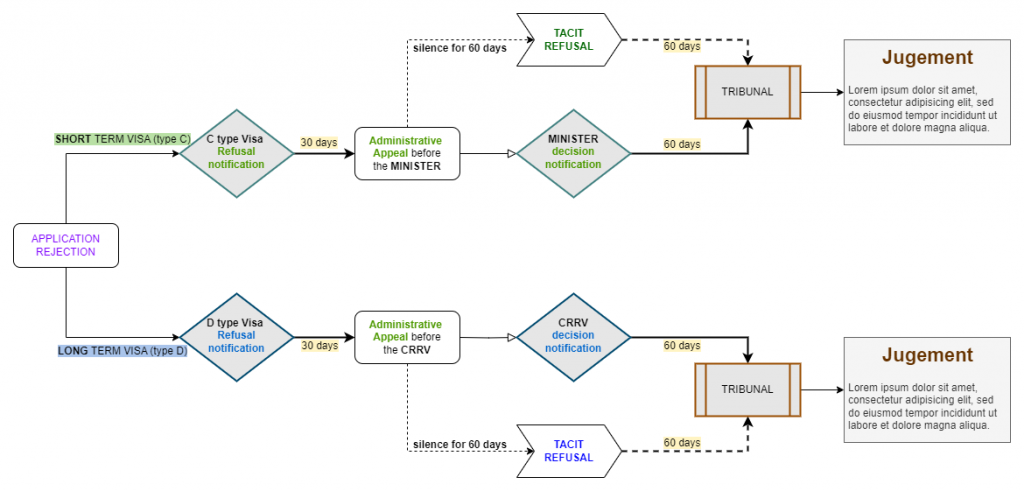Before setting out to litigate a rejection of a French Visa Application, it is necessary to lodge an administrative appeal. This first step is mandatory. If this administrative appeal is not satisfactory, it will then be necessary to refer the matter to the Court.
Alongside these contentious actions, it is always possible to present an amicable appeal to the French authorities but one should not expect very positive results. Above all, amicable appeals do not interrupt the time limits for litigation, which are quite short.
The consulate or embassy with which the foreigner has submitted a request for issuance of a visa may refuse to grant it, knowing that the consular authority has broad discretion to grant or refuse a visa. and can be legally based on any consideration of general interest.
As illustrated in the diagram below, the challenge to a Visa refusal is different depending on whether it is a Visa application for a short stay (Visa type C for a stay of less than 3 months) or a Visa application for a long stay (Visa type D for a stay of more than 3 months).

1 – THE DISCRETIONARY REMEDY
Please note that the informal appeal is optional and independent of the litigation appeal.
It is advisable not to place too much hope on the outcome of such an appeal and to concentrate immediately on the preparation of an administrative appeal because the discretionary remedy does not interrupt the deadlines.
The discretionary appeal consists of requesting a review of the decision from the consular or diplomatic authority which took it. The applicant must send a letter to the consular service with which the visa application was submitted.
In this letter, the applicant must explain in detail the reasons why he made his visa application, the explanation and documents he attached to it along with any supporting evidence likely to strengthen his argument.
He must also attach either a copy of the letter rejecting the visa application, or a copy of the application or any other supporting document attesting to the submission of the application if it is an implicit refusal.
It is important not to wait for the response to this optional appeal because the litigation deadlines are short as illustrated in the diagram initially presented.
2 – THE ADMINISTRATIVE APPEAL – step one to litigate a rejection
For long-stay visas, litigation is filed before the Commission for Appeals against Visa Refusals (CRRV).
For short-stay visas, litigation is filed before the Ministry of the Interior, at the Deputy Director of Visas.
If the person concerned does not present a prior administrative appeal, he loses any possibility of challenging the visa refusal decision before the administrative judge.
It is mandatory to make this appeal and present relevant legal arguments likely to contradict the reasons presented under the legal grounds.
This mandatory prior appeal is essential, on pain of inadmissibility of the contentious appeal before the administrative judge.
The Appeal is made by registered letter with return receipt, presenting the arguments and all useful documents.
It must be drawn up in French and signed by the person who is the subject of the contested refusal decision or by a duly authorized representative or by an Attorney.
3 – THE REFERRAL TO THE TRIBUNAL – step two to litigate a rejection
The annulment appeal allows you to request the annulment of a visa refusal, or even an injunction to issue the visa if it was illegally refused.In the event of an emergency, the judge may receive a request to suspend the refusal decision.
If the administrative appeal is rejected, the interested party may file a contentious appeal before the administrative court of Nantes provided that the administrative appeal has been filed within 30 days following the visa refusal.
The referral to the Court must be filed within a period of two months from the notification of the Commission’s rejection decision or the Minister’s decision.
But it can also be filed within two months following referral to the Commission if the latter has not rendered any decision. Note that it is obligatory to refer the matter to the Court within 2 months following the decision, whether implicit or express.
It must be demonstrated that the reasons given for coming to France are accurate and that the request was in no way motivated by a desire to divert the purpose of the visa issued or to make illegal use of it.
The possibility of an appeal is removed for appeals concerning short-stay visas and travel authorizations. This means that the Nantes Administrative Court will rule in first and last instance. After this judgment, only an appeal to the Court of Cassation will be possible.
In conclusion : visa applications must be subject to particular attention and rapid support in the event of refusal. Under the guise of simplifying procedures, new constraints are added and weigh on foreign nationals.
references:Décret n° 2022-962 and Décret n° 2022-963
NEED ASSISTANCE?
